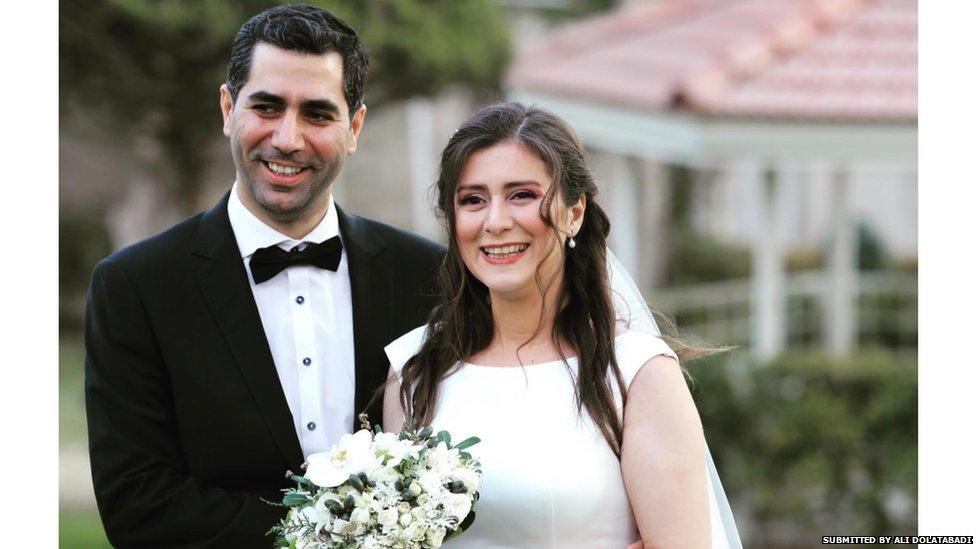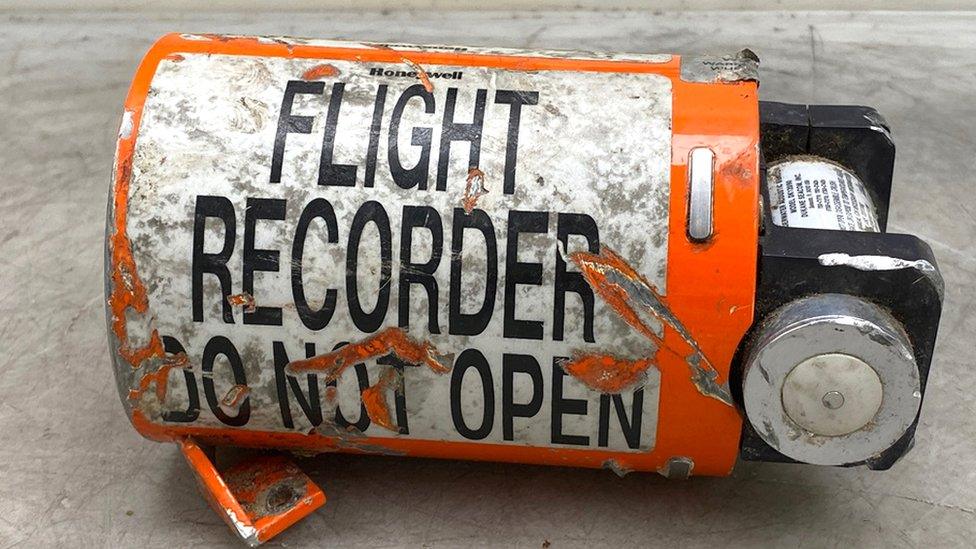Iran plane crash: Victims' families to get $150,000
- Published
Footage appears to show missile strike on Ukrainian plane in Iran
Iran is to give $150,000 (£110,000) to the families of each of the 176 people who died when its Revolutionary Guards shot down a passenger jet last January.
Ukraine has called for negotiations over the compensation and for those behind the attack to face justice.
The Ukraine International Airlines Boeing 737 was struck by two missiles shortly after taking off from Tehran.
After initially denying responsibility, Iran admitted it had shot down the UIA flight "unintentionally".
Tehran called it a "disastrous mistake" by the Revolutionary Guards Corps.
The victims included 82 Iranians, 63 Canadians, 11 Ukrainians including nine crew members, four Afghans, four Britons and three Germans.
Iran's air defences had been on high alert at the time. Hours earlier, the country had fired ballistic missiles at two US bases in Iraq in retaliation for the killing of top Iranian general Qasem Soleimani by a US drone strike in Baghdad.
How has Iran handled the investigation?
In a statement, Iran's government said it would pay the compensation "as soon as possible".
On Wednesday Tehran also said it had sent its final report on the crash to the countries which had been investigating it - Ukraine, the US, France, Canada, Sweden, the UK and Germany.
But Ukraine's foreign ministry said compensation amounts should be arrived at through negotiations according to international practice, and demanded those behind the attack face prosecution.
"The Ukrainian side expects from Iran a draft technical report on the circumstances of the aircraft shooting down," ministry spokesman Oleh Nikolenko said.
"This situation is especially unacceptable, since we are talking about the fate of innocent people," he said, adding that Ukraine would continue to try to ensure that those responsible faced justice.

Siavash Ghafouri-Azar and his wife Sara Mamani were among those killed
Earlier this month an independent Canadian report questioned Iran's investigation into the incident.
Many crucial details had not been disclosed, such as the names of those determined to be responsible for carrying out the attack, and questions such as why Iranian airspace had not been closed on the night of 8 January had not been answered, the report, written by the Canadian government's special counsel on the incident, said.
"The party responsible for the situation is investigating itself, largely in secret. That does not inspire confidence or trust," said the report.
Hamed Esmaeilion, spokesman for the Association of Families of Flight PS752, said families wanted those responsible to face justice in an independent court and a fully accountable investigation into the incident.

The recovered flight recorder from Ukraine International Airlines (UIA) Flight PS752
Iran also delayed releasing the plane's "black box" voice recorder for six months, but in July sent it to France for examination.
What happened to Flight PS752?
On 8 January, at 06:12 local time (02:42 GMT), UIA flight PS752 took off from Imam Khomeini International Airport in Tehran.
The plane was a Boeing 737-800 - one of the international airline industry's most widely used aircraft models.
Before leaving the airport's air space, the plane appeared to turn around to return to the runway. Shortly afterwards, it crashed.


The government in Tehran initially said the UIA plane had suffered a technical problem shortly after take-off. It cited witnesses including the crew of another passenger plane who said it had been on fire prior to impact.
Authorities said they had lost radar contact when the plane was at an altitude of about 8,000ft (2,400m), minutes after taking off.
A later report by the Civil Aviation Organisation of Iran said the air defence unit that targeted the passenger plane had recently moved and had failed to calibrate its equipment correctly. As a result, it misidentified the civilian plane as a hostile object.
The report also said the missile battery had been unable to communicate with its command centre, and had fired on the plane without receiving official approval.